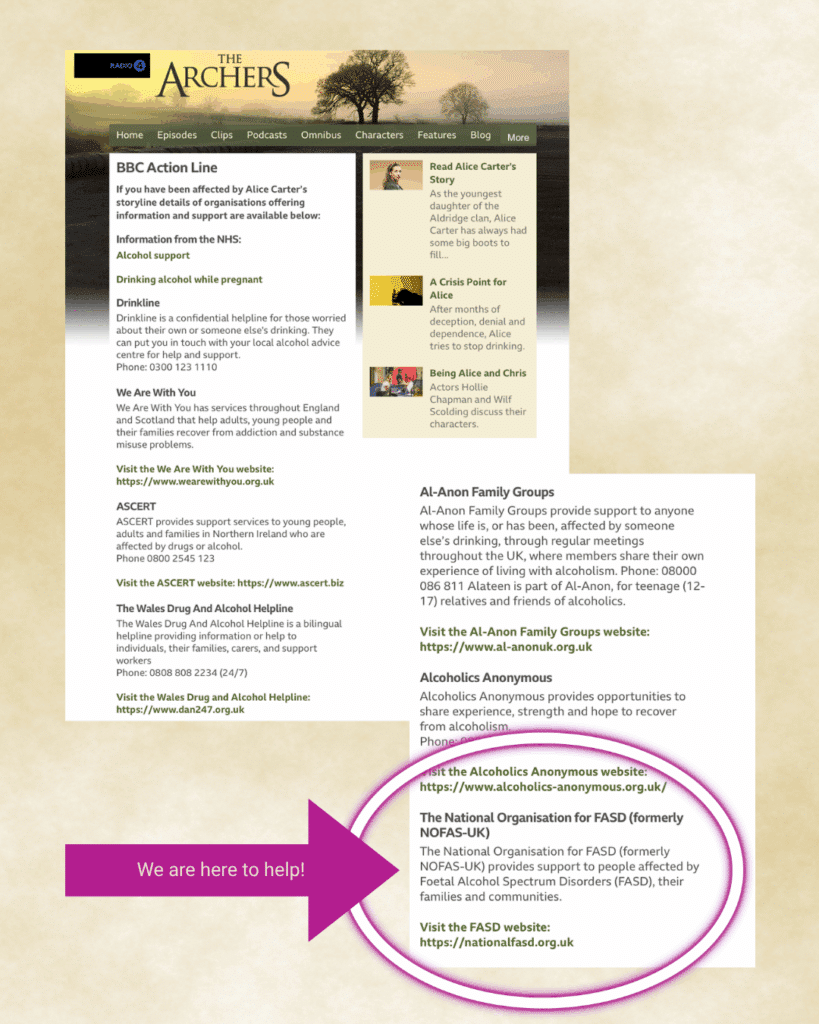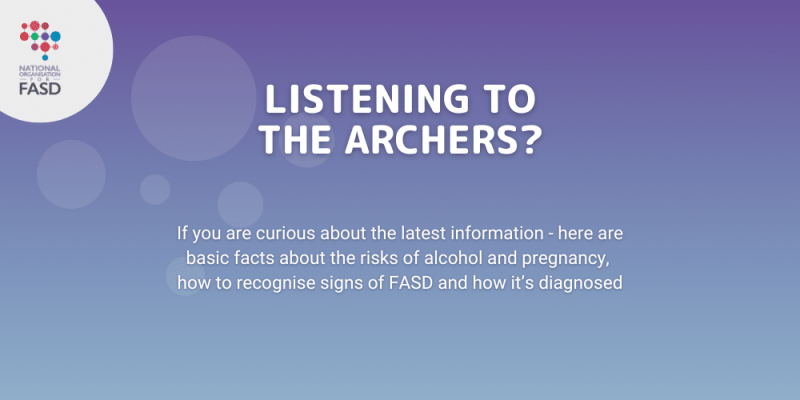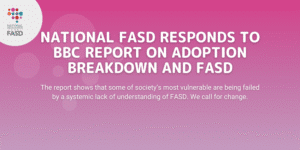What is this all about?
Fan sites are buzzing about Alice’s recent concerns about her child’s development, wondering if it’s possible that alcohol exposure during pregnancy might have had a role.
Here are some facts
It’s early days. But it’s actually really positive that the nursery is starting this discussion now.
- More and more people are understanding the risks of alcohol and pregnancy and these discussions will happen more frequently. The Archers’ storyline is showing how important these discussions can be, even if they are not always easy and even if everyone may not have the same level of information.
- One example is that the terms have changed. Alice and most of the fan sites are talking about “Fetal Alcohol Syndrome”. In the UK this term is now outdated. It refers to people who might have certain facial features that we now know affect less than 10% of those with what is now called FASD (Fetal Alcohol Spectrum Disorder, with or without sentinel facial features). Because the brain develops throughout the pregnancy it is the most vulnerable.
- While Alice drank heavily it’s not just something that can affect kids born to heavy drinkers.
- The sooner children with FASD have the right assessments, the sooner support can be put in place. Even if it ends up not being FASD those assessments can help spot specific concerns so the right help can be put in place.
- Current guidance in effect in England, Scotland and Wales says that prenatal alcohol exposure should be “actively considered” if a child is experiencing delays. NICE Quality Standards say that children who were alcohol-exposed in utero should be assessed. (While it’s possible to have a diagnosis earlier, some of the assessments might be most effectively done after the age of around 6).
- It’s important to have open and honest discussions about alcohol-exposed pregnancies. Lives are complex. Women don’t drink to harm their children. Most either don’t know they are pregnant, don’t understand the risks, or need help to stop.
- If you are pregnant and have been drinking, including before you knew you were pregnant, talk to your midwives and let them know so they can help you. Alcohol in pregnancy can also risk miscarriage, premature birth, and stillbirth. The UK Chief Medical Officers say it’s safest to avoid alcohol in pregnancy.
- Learn the signs and symptoms of FASD so that if you have any concerns about your child’s development you can raise them as soon as possible.
- If you think your child might have FASD talk to your GP or paediatrician. If they fob you off tell them NICE Quality Standard 204 says people should have an assessment.
- FASD is more common than most people realise – it is more common than autism! But most are undiagnosed, which is sad as diagnosis and appropriate support help create brighter futures. People with FASD tell us the diagnosis helps.
Here are some signs of FASD
If your child was exposed to any amount or type of alcohol at any time during pregnancy and is facing challenges at school, at home or in the community, then ask about FASD. Signs include:
- Difficulty learning, processing information or organising daily tasks;
- Intellectual and/or developmental disabilities;
- Unpredictable behaviour;
- Hyperactivity or attention problems;
- Memory challenges;
- Sensory difficulties;
- Challenges in the classroom;
- Difficulties with abstract thinking and making judgements including challenges with maths, understanding time and money;
- Social skills and adaptive behaviour challenges including behaving at a level much younger than their actual age;
- Struggling with motor skills;
- Poor social communication;
- Struggling to learn from experience and repeating the same thing time and time again especially when stressed;
- Sleep issues.
If you know the pregnancy was alcohol-exposed, talk to your doctors and say you would like an assessment for FASD.
Find out more!
There are support groups across the country. See the FASD UK Alliance.
National FASD’s website has lots of information.
Click here for more about alcohol and pregnancy.
Click here for more information about FASD.
There is information here about how FASD is diagnosed.
See some of the most Frequently Asked Questions to our helpline here.




